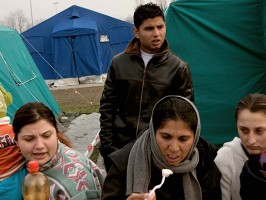On the occasion of the international Rroma Day, the chairman of the European Rroma Rights Centre, Robert Kushen, reflects on the situation of the Rroma in Europe and the continuing challenges for this minority (Kushen 2014). He arrives at a sober view: the decade of Rroma inclusion, which was adopted in Sofia in 2005, and encompassed the countries of Albania, Bosnia and Herzegovina, Bulgaria, Czech Republic, Hungary, Macedonia, Montenegro, Romania, Serbia, Slovakia and Spain, unfortunately cannot fulfil the expectations that it raised. Rroma are still affected by widespread poverty, discrimination, unemployment and insufficient access to public institutions such as schools and hospitals: “Despite this political recognition of an unconscionable social crisis, Roma remain among the poorest, unhealthiest, least educated and most marginalised European citizens. The data are devastating: Across Central and Southeast Europe, 90 percent of Roma live in poverty. Fewer than one third of adults have paid employment. Only 15 percent of young Roma have completed secondary or vocational school. Nearly 45 percent of Roma live in housing that lacks basic amenities. Life expectancy in Roma communities is 10-15 years less than in non-Roma communities, with many Roma lacking access to insurance and health care.” Kushen refers in his judgement to information from the United Nations Development Programme (UNDP 2013). Reasoning with such figures is not without dangers, since the representation of the Rroma as uneducated, poor, and unhealthy is often interpreted by the polemical, public discourse as a cultural peculiarity of the minority, although these characteristics are inevitably a poverty phenomenon. Although is not to deny that numerous Rroma are poor and uneducated, the relevant question is whether such an argument can contribute to the integration of the Rroma. In addition, surveys often only take into account the visible Rroma, because the integrated ones are hard to identify as Roma and difficult to contact. Not only images of misery are needed, which generate compassion, but also images of success that allow a positive identification.
Kushen continues with information about the marginalization of the Rroma in Italy, France, Sweden and Hungary, and then gets on to the latest report from the European Union on the situation of the Rroma. The report published on April the second this year, can not present success stories either: “In early April, the European Commission convened a “Roma Summit” and issued a report assessing how member states are doing in addressing the interconnected problems of poverty and discrimination which the Roma are facing. The report noted “the persistence of segregation” in education, a large and in some cases widening employment gap between Roma and non-Roma, big differences between Roma and non-Roma in health insurance coverage, and an “absence of progress” in addressing the need for housing. Finally, the report noted that discrimination remains “widespread” (compare European Commission 2014).

